While studying for a midterm exam, Jaime Martin Ko Atilano received a LinkedIn message from a professor at Georgetown University. The professor, Eric Koester, asked for a 10-minute phone call, saying he wanted them to join a creators program for prospective authors.
Although they said they originally thought it was a scam, Ko Atilano took the phone call.
Koester told the University of Maryland alum he had seen their writing and YouTube content. Then, he asked if they had ever thought about writing a book.
“I thought I had to be 40 and lived a life to write a story,” said Ko Atilano, who graduated from the University of Maryland in 2020 with a degree in marketing and supply chain management.
But Koester asked Ko Atilano to join bSchool, his program that is designed to let people “discover and demonstrate” their purpose through making a book. The course breaks the myth that authors are alone, they said, and emphasizes that multiple people are included in the process of publishing a book.
Ko Atilano agreed, and over the span of 10 months, they completed the program and published their debut fiction novel. Mala & the Mask of Gold was published with independent publisher New Degree Press in December 2020.
The story follows Mala and their brother Salem through the journey of trying to save the world of Zambo from destruction at the hands of the evil Bakunawa after being visited by Sidapa, the Deity of Death.
The adventure book intertwines Filipinx culture and queer identity, standing as representation for both communities.
Ko Atilano grew interested in advocating for LGBT issues at this university after taking LGBT studies courses. They wanted to share what they learned to those without the same access.
“I have all this great knowledge about queerness and queer identity,” they said, “but what does that do, if I’m not sharing this wealth of knowledge to everyone?”
They began working in queer advocacy through UMD Pride Alliance, a student organization that advocates for the university’s LGBT population, and True Colors of Maryland, a discussion group for LGBT students of color.
[The war between Gen Z and millennials is nothing new]
During their sophomore year, they were also involved with the Equity Center’s Speaker’s Bureau and the Women’s Studies/LGBT Studies Undergraduate Research Day, where they presented a documentary about transgender-inclusive health care and a research presentation titled “How Non-normative Bodies Disrupt the Ideologies/Policies of Sex Work.”
Along with other endeavors, such as belonging to the Smith Business Academy, interning at the National LGBT Chamber of Commerce and becoming communications director for the Pride Alliance, Ko Atilano also joined the Student Government Association and introduced a bill for multi-user all-gender bathrooms.
Working with the Pride Alliance, Equity Center and the President’s Commission on Disability Issues, the bill passed in 2020. The bill benefited both trans and people with disabilities, Ko Atilano said, noting how these issues, like many others, are “intertwined.”
“It doesn’t have to be a one-part issue,” they said. “It involves working on trying to integrate all of those things together into one bill that was really an advocate for that.”
Their research and advocacy culminated in them winning the Lorde-O’Leary Award, an award given to a senior for their significant work of advancing the LGBT student community at this university.
Ko Atilano applied for the award “on a whim” because someone recommended it to them.
“I don’t need an award to be recognized for the work I did, but it was nice to definitely have that,” they said. “I want more queer students, faculty members to feel safe at the school, and that was always my goal in doing the work I did.”
This advocacy work continues in their fantasy novel, particularly with the topic of representation. Ko Atilano considers representation “being seen and being heard and being listened to.”
“I say those things because, yes, I could see myself in a book or I can see myself in the movie,” Ko Atilano said. “But if the story is not something that resonates with my experience or resonates with the true experience of me as a queer person or me being an immigrant and all of those things, it’s not good representation.”
Ko Atilano wanted to represent the Filipinx community “in a very positive light” while celebrating “queer joy,” “identity” and “empowerment that has hardships” — specifically authentic hardships that don’t lean into media tropes.
Ko Atilano’s novel contains such representation through Mala, a nonbinary protagonist, and Ate Lanie, a trans woman shaman as a mentor. They said the purpose of this was for readers to see “a trans woman in a leadership role, see her celebrate, see her powerful, and … to see a connection with her and the protagonist who is gender fluid, nonbinary.”
Ko Atilano researched the intersectionality of being Filipinx and queer for the book, including interviewing trans, nonbinary and queer people, Filipinx people and family.
[Digital Blackface is well-documented. Why won’t it go away?]
During their research, Ko Atilano found that Babaylans, Philippine shamans, were transgender and nonbinary before colonization.
“There [was] literal documentation of seeing trans people existing and trans people being magic but not being imaginary,” they said.
Ko Atilano drew inspiration for Ate Lanie from the goddess of fertility, Lakapati. They said “showing trans people in this light, especially trans women,” as “powerful,” “gifted” and “nurturing,” would humanize them.
But Mala & the Mask of Gold isn’t solely about positivity — the characters work through struggles, too. Tension exists between Mala and their brother, Salem, because of their different identities. The story also deals with other topics such as grief and interpersonal relationships.
Ko Atilano wanted the book to explore healing, Filipinx culture and family dynamics from a queer Filipinx standpoint.
“I wanted to pinpoint healing as that kind of road as queer folk are trying to explore their identity,” they said.
Ko Atilano also said they want readers and families to understand that Filipinx queer children “need you more than ever to care and love for them, because that’s where the healing starts.” They want readers, even if they are not queer, to learn and connect with at least one aspect of the story.
“My biggest takeaway is: I want readers to know that they can own their own story,” Ko Atilano said. “I want folks to know … that the magic exists in them.”
One reader even reached out to Ko Atilano to share that the book inspired them to learn how to become a Babaylan.
But Ko Atilano’s work has not stopped at simply publishing their book. They reached out about their book to this university’s business school dean, Victor Mullins, and Mullins ordered 50 copies.
Mullins was a huge inspiration to Ko Atilano because of the dean’s strong message surrounding personal branding and “not being afraid to own your own story,” they said. Ko Atilano even put Mullins in the acknowledgements of the book.
The 50 copies will be used for a workshop led by Ko Atilano with one of the business schools’ student groups, Queer Leadership Accelerator. The group focuses on creating an inclusive community for LGBT students in the business school and beyond, along with building leadership.
Ko Atilano hopes to do more workshops in the future at middle and high schools, and hardcover and audiobook editions of their book are in the works.



